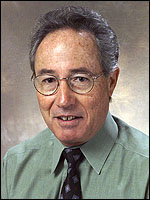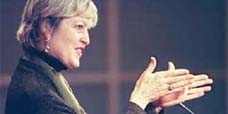2006.07.20: July 20, 2006: Headlines: COS - India: Cross Cultural Issues: UB Reporter : John Stone experienced his first encounter with culture clashes as a Peace Corps volunteer in rural India
Peace Corps Online:
Directory:
India:
Peace Corps India:
The Peace Corps in India:
2006.07.20: July 20, 2006: Headlines: COS - India: Cross Cultural Issues: UB Reporter : John Stone experienced his first encounter with culture clashes as a Peace Corps volunteer in rural India
John Stone experienced his first encounter with culture clashes as a Peace Corps volunteer in rural India

Stone spent time in India during the late-1960s surveying fields for purposes of irrigation and contour farming. But once, after a minor mix-up with the townspeople erased 24 hours of hard work, Stone discovered that his anger with the situation was at odds with the outlook of the local residents, who viewed the situation with greater aplomb. The difference was in his cultural orientation, said Stone, a Buffalo native who spent 17 years in Brazil, as well as two in India and one in Greece. Westernized cultures often measure the value of actions in terms of their product or results, he said, while Eastern cultures often place greater emphasis on an action's intent. The lack of results from his work didn't affect the Indian farmers' attitudes towards him, he noted.
John Stone experienced his first encounter with culture clashes as a Peace Corps volunteer in rural India
Cultural awareness advocated in rehabilitation services
By KEVIN FRYLING
Reporter Staff Writer
As the nation's foreign-born population continues to increase, health and rehabilitation service providers must become more aware of their clients' cultural orientations and bridge the gap between their culture and that of their clients, the director of UB's Center for International Rehabilitation Research Information and Exchange (CIRRIE) said during a UBThisSummer lecture last week.
John Stone, clinical associate professor in the Department of Rehabilitation Services, offered strategies in which professionals can negotiate such cultural differences during the July 13 lecture, entitled "Disability and Culture."
Stone recalled that he experienced his first encounter with the sort of culture clashes that rehabilitation service providers face now more than ever while working years ago as a Peace Corps volunteer in rural India.
Stone spent time in India during the late-1960s surveying fields for purposes of irrigation and contour farming. But once, after a minor mix-up with the townspeople erased 24 hours of hard work, Stone discovered that his anger with the situation was at odds with the outlook of the local residents, who viewed the situation with greater aplomb.
The difference was in his cultural orientation, said Stone, a Buffalo native who spent 17 years in Brazil, as well as two in India and one in Greece. Westernized cultures often measure the value of actions in terms of their product or results, he said, while Eastern cultures often place greater emphasis on an action's intent. The lack of results from his work didn't affect the Indian farmers' attitudes towards him, he noted.
"Who you were was more important than what you accomplished," he said.
Western and Eastern cultures also differ in terms of individualism versus collectivism. Stone points out that collectivist values mean a health-care worker might face a difficult situation when a mother and daughter both want the mother present as the service provider conducts a sensitive examination or interview.
The individual-based, action-oriented culture inherent to rehabilitation services sometimes clashes with the cultural orientation of the people it serves, said Stone, who noted that cultural awareness by service providers must increase in importance as the nation's foreign-born population rises.
"About 5 percent of the population in the U.S. was born outside the country 30 years ago. Today, that number is more like 11 percent," he said.
Nearly 35 percent of foreign-born individuals in the U.S. are from Central America, he said, with about 26 percent from Asia.
Stone noted that clients from foreign cultures sometimes perceive their disabilities in different terms than their rehabilitation providers. Although modern cultures use biomedical and social terms to explain disabilities, there are other cultures that view them through religious or folk beliefs. Some see disabilities as punishment for sins in this life or a previous life, or as the result of the malevolent influence of spirits. There also are cultures that view certain conditions, such as blindness, as a source of mystical power or as a gift from God.
Moreover, reactions to disabilities are not the same across the board. Some Latino cultures, for example, find it shameful for disabled individuals to work, said Stone, because it is seen as an indication that their families are too poor or otherwise unable to provide for them. Other cultures prefer to confine disabled individuals.
However, it is not the job of rehabilitation providers to alter the fundamental beliefs of their clients, said Stone, who admitted there are attitudes that some might find "repugnant." At least outward tolerance of other beliefs about disabilities is required, he said, explaining that there are effective methods through which professionals can nudge their clients toward a more positive position on disabilities within their own belief system.
The service provider needs to be able to bridge the gap between the rehabilitation system and the culture of the foreign-born client," said Stone. For example, a rehabilitation worker who has a disabled Muslim client who believes it is rebellion to avoid a divine "test of faith" might cite the well-known statement: "For each illness, Allah provides a remedy."
Such methods are known as "culture brokering," said Stone. The term first arose with anthropologists who used it to describe individuals in colonized nations whose knowledge of both societies allowed for conflict mediation through cross-cultural communication.
He has met numerous "culture brokers" abroad who were kind individuals who eased his cultural confusions by providing pertinent facts or explanations, he said.
Heath-care workers later adapted the cultural-broker concept, he said. Mary Ann Jezewski, associate dean for research and director of the Center for Nursing Research in the School of Nursing, developed a theoretical health-services model that CIRRIE applies to rehabilitation services, he said.
Stone acknowledged that rehabilitation workers cannot know all cultures, but cultural-assessment methods, as well as general knowledge of other cultural beliefs about disabilities, enable service providers to demonstrate "cultural competence" in their interactions with clients. This resolves conflicts and makes sure that cultural differences do not prevent those who need it from receiving assistance.
"To continue to mature as professionals and as human beings, [service providers] must swim in the multicultural, multireligious, multi-ideological ocean of modern and postmodern society," said Stone. "As do all of us."
When this story was posted in August 2006, this was on the front page of PCOL:





Peace Corps Online The Independent News Forum serving Returned Peace Corps Volunteers
 | The Peace Corps is "fashionable" again
The LA Times says that "the Peace Corps is booming again and "It's hard to know exactly what's behind the resurgence." PCOL Comment: Since the founding of the Peace Corps 45 years ago, Americans have answered Kennedy's call: "Ask not what your country can do for you--ask what you can do for your country. My fellow citizens of the world: ask not what America will do for you, but what together we can do for the freedom of man." Over 182,000 have served. Another 200,000 have applied and been unable to serve because of lack of Congressional funding. The Peace Corps has never gone out of fashion. It's Congress that hasn't been keeping pace. |
 | Changing the Face of Hunger
In his new book, Former Congressman Tony Hall (RPCV Thailand) says humanitarian aid is the most potent weapon the United States can deploy against terrorism. An evangelical Christian, he is a big believer in faith-based organizations in the fight against hunger. Members of Congress have recently recommended that Hall be appointed special envoy to Sudan to focus on ending the genocide in Darfur. |
 | PC will not return to East Timor in 2006
Volunteers serving in East Timor have safely left the country as a result of the recent civil unrest and government instability. Latest: The Peace Corps has informed us that at this time, the Peace Corps has no plans to re-enter the country in 2006. The Peace Corps recently sent a letter offering eligible volunteers the opportunity to reinstate their service in another country. |
 | Chris Dodd considers run for the White House
Senator Chris Dodd plans to spend the next six to eight months raising money and reaching out to Democrats around the country to gauge his viability as a candidate. Just how far Dodd can go depends largely on his ability to reach Democrats looking for an alternative to Hillary Clinton. PCOL Comment: Dodd served as a Volunteer in the Dominican Republic and has been one of the strongest supporters of the Peace Corps in Congress. |
 | Vasquez testifies before Senate Committee
Director Vasquez testifies before the Senate Foreign Relations Committee on his nomination as the new Representative to the United Nations Agencies for Food and Agriculture replacing Tony Hall. He has been the third longest serving Peace Corps Director after Loret Ruppe Miller and Sargent Shriver. PCOL Comment: Read our thanks to Director Vasquez for his service to the Peace Corps. |
 | Interview with a Hit Man
RPCV John Perkins says that for many years he was an "economic hit man" in the world of international finance whose primary job was to convince less developed countries to accept multibillion dollar loans for infrastructure projects that left the recipient countries wallowing in debt and highly vulnerable to outside political and commercial interests. In this exclusive interview for "Peace Corps Online," Colombia RPCV Joanne Roll, author of Remember with Honor, talks to Perkins about his Peace Corps service, his relation with the NSA, "colonization" in Ecuador, the consequences of his work, why he decided to speak out, and what his hopes are for change. |
 | Peace Corps stonewalls on FOIA request
The Ashland Daily Tidings reports that Peace Corps has blocked their request for information on the Volkart case. "After the Tidings requested information pertaining to why Volkart was denied the position — on March 2 — the newspaper received a letter from the Peace Corps FOIA officer stating the requested information was protected under an exemption of the act." The Dayton Daily News had similar problems with FOIA requests for their award winning series on Volunteer Safety and Security. |
 | PCOL readership increases 100%
Monthly readership on "Peace Corps Online" has increased in the past twelve months to 350,000 visitors - over eleven thousand every day - a 100% increase since this time last year. Thanks again, RPCVs and Friends of the Peace Corps, for making PCOL your source of information for the Peace Corps community. And thanks for supporting the Peace Corps Library and History of the Peace Corps. Stay tuned, the best is yet to come. |
 | History of the Peace Corps
PCOL is proud to announce that Phase One of the "History of the Peace Corps" is now available online. This installment includes over 5,000 pages of primary source documents from the archives of the Peace Corps including every issue of "Peace Corps News," "Peace Corps Times," "Peace Corps Volunteer," "Action Update," and every annual report of the Peace Corps to Congress since 1961. "Ask Not" is an ongoing project. Read how you can help. |
 | RPCV admits to abuse while in Peace Corps
Timothy Ronald Obert has pleaded guilty to sexually abusing a minor in Costa Rica while serving there as a Peace Corps volunteer. "The Peace Corps has a zero tolerance policy for misconduct that violates the law or standards of conduct established by the Peace Corps," said Peace Corps Director Gaddi H. Vasquez. Could inadequate screening have been partly to blame? Mr. Obert's resume, which he had submitted to the Peace Corps in support of his application to become a Peace Corps Volunteer, showed that he had repeatedly sought and obtained positions working with underprivileged children. Read what RPCVs have to say about this case. |
 | Why blurring the lines puts PCVs in danger
When the National Call to Service legislation was amended to include Peace Corps in December of 2002, this country had not yet invaded Iraq and was not in prolonged military engagement in the Middle East, as it is now. Read the story of how one volunteer spent three years in captivity from 1976 to 1980 as the hostage of a insurrection group in Colombia in Joanne Marie Roll's op-ed on why this legislation may put soldier/PCVs in the same kind of danger. Latest: Read the ongoing dialog on the subject. |
Read the stories and leave your comments.

Some postings on Peace Corps Online are provided to the individual members of this group without permission of the copyright owner for the non-profit purposes of criticism, comment, education, scholarship, and research under the "Fair Use" provisions of U.S. Government copyright laws and they may not be distributed further without permission of the copyright owner. Peace Corps Online does not vouch for the accuracy of the content of the postings, which is the sole responsibility of the copyright holder.
Story Source: UB Reporter
This story has been posted in the following forums: : Headlines; COS - India; Cross Cultural Issues
PCOL33721
39


























